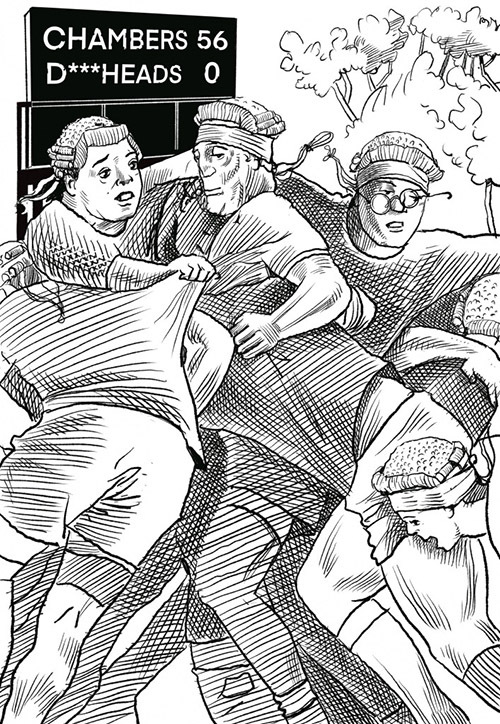- Winter 2022
- A 'no d***heads policy' for the NSW Bar?

Many a successful sporting team has credited their victories to a ‘no d***heads policy’, designed to promote a team ethos and ensure that no player, regardless of ability, is larger than their team. The origins of the policy are the subject of trans-Tasman debate, as many good things are. It was introduced by Paul Roos as coach of the Sydney Swans but the All Blacks have also adopted the policy, with a degree of success that speaks for itself (and it may account for the Black Caps’ inexplicable but also successful decision to start being nice to the opposition during cricket matches). The no d***heads policy has since become an accepted recruitment philosophy for businesses of all kinds.
Is a no d***heads policy relevant to a barrister’s practice? After all, we are sole practitioners, not traditionally viewed within a team structure. The rules and principles governing our practices as independent practitioners with duties to the court and the administration of justice, servants of all, yet of none, don’t necessarily lend themselves to a policy that has us as a cog in a wheel. But this is a narrow view of the environment in which we operate.
Most of us are involved in chambers and work together with colleagues and staff to promote the chambers as a good source of work. When we litigate we are in a team sport environment, of sorts – two opposing sides consisting of barristers, solicitors and clients operating in accordance with an established set of rules under an independent referee with a winning and losing outcome. People get pretty emotional about who wins and loses. The most prominent cases, for better or worse, are covered and followed in a similar way to a sporting match.
The application of the no d*heads policy to these circumstances can be tested by examining what it involves. D*heads, according to the All Blacks, are people who put themselves ahead of the team, people who think they’re entitled to things, expect the rules to be different for them, people operating deceitfully in the dark, or being unnecessarily loud about their work.
There are any number of conduct rules that touch on these aspects of being a d***head. If you put yourself ahead of the team you may be in breach of your duty to the court, or the client, or your opponent (Barristers Rules 23, 35 and 49). Those of us who are too loud about our work risk running afoul of the rules about honest media coverage (Barristers Rules 76 and 77). Those operating deceitfully in the dark are those that may well breach the duty not to knowingly or recklessly mislead the court (Barristers Rule 24).
The aspect of d*head behaviour that comes up too frequently is that engaged by Barristers Rules 8 and 123. You can read elsewhere in this edition about how those rules apply to bullying, discrimination and sexual harassment, all commonly accepted d*head behaviours. There are consequences for sportspeople who engage in this sort of behaviour, and an ongoing debate about whether there should be more. There should be consequences for barristers who engage in it also, and for those barristers who tolerate it of their colleagues, or make it hard for people to complain about it.
A barrister who shouts at or belittles their junior or solicitor or opponent for not doing things the way they prefer is putting themselves ahead of the team that exists in the courtroom. A barrister who makes sexualised or personal comments to someone in a work context is displaying a sense of entitlement to behave as they please regardless of how it may affect the target of their comments. A member of chambers who treats a complaint of bullying or harrassment and the laws and guidelines applicable to handling such complaints as an inconvenience is a person who expects the rules to be different for them. A barrister who seriously harasses or assaults a colleague will often do so in the ‘dark’ so that the only evidence is the word of that colleague.
Conduct that involves bullying, harassment and discrimination is often discreditable to a barrister. It frequently involves dishonesty, particularly when a barrister seeks to deny it or cover it up. It is definitely likely to bring the legal profession into disrepute, because, put crudely, people expect barristers not to be d***heads. For all these reasons a barrister who bullies, harasses or discriminates offends Barristers Rule 12, as may a barrister who condones or allows such behaviour in others.
In recent years there has been a focus on changing bullying, harassing and discriminatory behaviours at the bar. It has been a standing item of work for at least the last six presidents of the Bar Association. It regularly features as an issue in these pages and in the media at large. I imagine it becomes tiresome talking and reading about it again and again. Imagine how tiresome it is to try to prevent this behaviour again and again. Imagine how demoralising it is to experience this behaviour again and again when it is less serious. Imagine how devastating it is to experience this behaviour, even once, when it is very serious.
It isn’t hard to think about whether what you say and do at work is going to hurt or offend a colleague, particularly where that colleague is more junior than you. It isn’t hard to notice when a colleague engages in bullying or harassing behaviour and to do something about it. If it is hard to know what to do, there are resources available to help you work it out.
We have an important job that affects the lives of other people. People care about how we go about our work in the same way, but for different reasons, that they care about a football player or a tennis player or a swimmer or a golfer. We should be people the general public can respect. We owe it to them not to be d***heads. BN

